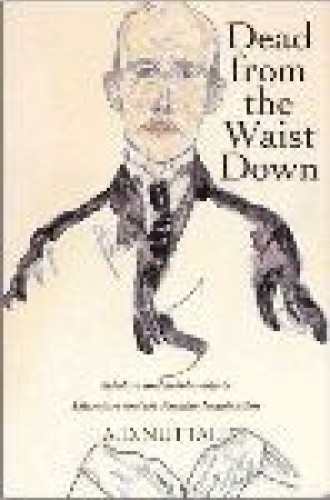Dead from the Waist Down
When such luminaries as Harold Bloom, Frank Kermode and John Hollander prepare the way for a book by calling it “thoroughly alive and enlivening,” “all the pleasure I expected” and “a major work of scholarship and of imaginative thought,” prudence warns me to mute my more tepid opinion.
A. D. Nuttall’s project is indeed brilliant. He asks, How did the popular image of the scholar transubstantiate from the Renaissance ideal of the swashbuckling voyager, the potent and alluring man exemplified by the astoundingly learned classical scholar Isaac Casaubon (1559–1614), contemporary of Shakespeare, into the desiccated, ineffectual Edward Casaubon of George Eliot’s Middlemarch (1871–72), characterized, according to Nuttall, by “sexless deathliness”? Why, in the 19th century, did the life of the mind become equated with a kind of death in life, and why were scholars seen as, in Robert Browning’s phrase, “dead from the waist down”?
Nuttall’s book contains many fresh insights, crisply and winsomely stated. The author, a professor of English at Oxford, occasionally apologizes for a breach of academic etiquette that I want to cheer: “Art seeps into life and, now, personal reminiscence spills incongruously into a supposedly neutral work of literary history.” Against attacks from both the deconstructionist left and the moralistic right, Nuttall argues for the ethical significance of patient, careful editorial work, the scholar’s passion to get it right. And he makes a persuasive case that there is still something positive to be said for the canon of English literature, that it has a value not entirely undercut by its dead white maleness.
There is much in this book that our culture needs to know, and much that would be salutary for people in the church to hear, read, mark, learn and inwardly digest. Suspicion of intellect has more currency in churches than it should. Nuttall is pretty hard on religion and theology (though it’s instructive how often he has to deal with them), and Christians deserve a lot of his barbs. Unfortunately, he is among the academics still caught in a time-warp, where 19th-century arguments against Christianity are still seen as the latest thing. But Nuttall would have served us well had he done little more than put before us a remark of a contemporary of Isaac Casaubon, Joseph Justus Scaliger: “Our theological disputes all stem from ignorance of grammar.”
I suspect, however, that Dead from the Waist Down will not have the good effect it should. It is uneven, and many readers will put it down unfinished. Nuttall minutely parses texts, often from Greek and Latin. He states the necessity of dealing head-on with the classical languages in order to make sense of the tradition of English literature, and he always translates. Though he is right, he could make his point without such intense probing. His purposes for this book would be perfectly well served by stopping at the molecular level, without separating out the atoms.
For Nuttall the canon of literature functions the way the canon of scripture does for preachers—something that makes his book appealing to religious readers. A line in Middlemarch will remind him of something in Keats which triggers a memory of something in Shakespeare, and then he’s off and running to Virgil and Horace. Nuttall hears the literary canon as a great conversation across generations, just as preachers are alert to the antiphonal music between and within the Testaments.
Unfortunately, Dead from the Waist Down is a patchwork. Nuttall acknowledges that the introduction and conclusion were originally written as separate essays. The chapters on the two Casaubons and Pattison, as well as the first part of the conclusion—on a play by Tom Stoppard about A. E. Housman—have the feel of “set pieces” stitched together. Now and then I could almost hear Nuttall reminding himself, “Oh, I have to get back to my theme.” And it’s a pity that a book praising precision has more than 20 typographical errors. Nuttall, a stickler for chronology, has “Byzantine scholars” in the third century making selections of Aeschylus’s plays for study in schools. Third-century scholars were no more Byzantine than Samuel Johnson was Victorian.
The book falls short of its promise, but its promise is very high. Readers will gain much of value from it, though they may wish to skip the stretches that bog them down. Nuttall makes a desperately needed case for scholarship. I just wish he had done so in a more consistent style and with a steadier eye on the prize.






